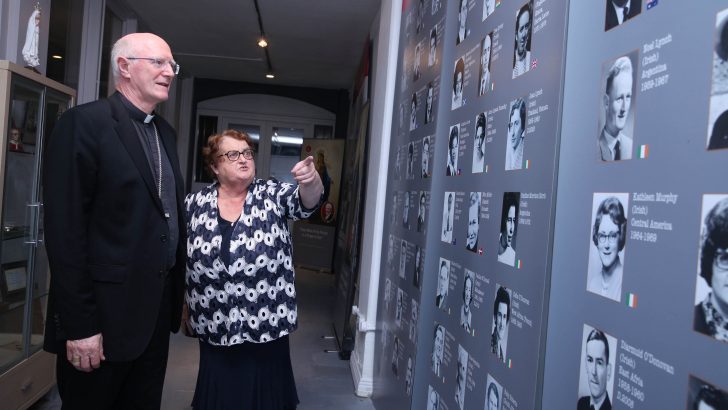Frank Duff was “a man ahead of his time”, the Archbishop of Dublin said September 3, as he celebrated Mass to mark 100 years since the Legion of Mary was founded.
Legion’s first meeting
In his homily in the church of St Nicholas of Myra on Francis Street, across the road from Myra house where the Legion’s first meeting took place September 7, 1921, Dr Dermot Farrell described Mr Duff “as prophetic in the true Christian sense of that word”.
“A man ahead of this time”, Frank Duff was “someone sensitive to the call of God and utterly dedicated to God’s will”, the archbishop told the 50 people attending the Mass, including Mary Murphy, president of the Legion of Mary. “He translated his prophetic perspective of the universal call to holiness into a vibrant lay movement.”
Comparing Mr Duff to John the Baptist, Archbishop Farrell said “he realised, ahead of his contemporaries that every Christian is called to the apostolic dimension of our faith”.
“It was only with the Second Vatican Council that the laity began to regain their rightful place in the Church. From its foundation in 1921 the Legion was carrying out the mission of the Church as was proposed by the Second Vatican Council.”
Though no one realised how far the small group Mr Duff founded would “spread its wings”, it grew “phenomenally” after its foundation, Dr Farrell said.
The Legion of Mary in Dublin still has a strength about it that it may not have in other parts of Ireland”
“It was an apostolate that grew phenomenally after its foundation, helped in no small way by the conviction and zeal of its earliest members, and the Legion’s profile in the Eucharistic Congress held in Dublin in 1932, a mere decade after its foundation,” he continued.
“There was a wonderful idealism in Frank Duff which prevented him from being blown off course, despite persistent opposition he experienced from ecclesiastical authority.”
Pointing to the success of the Legion in spreading across the world, the Archbishop of Dublin praised its “significant” role in “organising the apostolate of the laity” across the developing world.
“This was the case in Africa – and we remember the gentle witness of Edel Quinn; it played a crucial role in the Columban mission to China – providing a natural extension of that mission, with Legionaries bringing dynamism and dedication of the rapidly growing Church in China. Many of them endured persecution and imprisonment.”
Formidable consequences
Archbishop Farrell said that, in a world “often hostile to the values and vision proclaimed by Christ”, the Legion’s apostolic work can have “formidable consequences”.
“The Legion of Mary in Dublin still has a strength about it that it may not have in other parts of Ireland,” he continued. “Why? Because from the start the Legion in Dublin tackled serious social and pastoral problems which other groups shied away from.
“They had an apostolate to prostitutes, for instance and set up the Morning Star hostel for the homeless. In contemporary Ireland, the apostolic work of Legionaries can have formidable consequences – if lived with authenticity, gentleness, and courage – at the social, political, cultural and economic levels.
“The values of the gospel are not just ideas; they are radical actions on behalf of the poor, the homeless and the refugees and migrants.”
Reminding the attendees that the Church’s charitable work is “guided by faith, that is by trust in God and what God is doing”, Dr Farrell said “the Legion cannot aim at solving all problems, but must trust in the way of Jesus, in prayer which sustains us in our service of others”.
Spirituality
He pointed out the Marian roots of its spirituality, adding that “in Mary we can see that at the centre of Christianity there are not merely ideas, but lives, real lives”.
“Everything about her reminds us that God’s heart is close to the poor, the weary and the oppressed. Like her son, she embodies the mission of the Church: to bring us home to the God who is already with us.”
Archbishop Farrell encouraged the Legion to continue to evangelise, and to embrace the call of Pope Pius XII that organisations “procure by every means that in Christian families the Scriptures be read with piety and devotion”.


 Ruadhán Jones
Ruadhán Jones Mary Murphy, President of the Legion of Mary, shows Archbishop of Dublin Dr Dermot Farrell pictures of Legion envoys from around the world at a reception after the centenary Mass on Friday, September 3.
Photo: John Mc Elroy
Mary Murphy, President of the Legion of Mary, shows Archbishop of Dublin Dr Dermot Farrell pictures of Legion envoys from around the world at a reception after the centenary Mass on Friday, September 3.
Photo: John Mc Elroy 